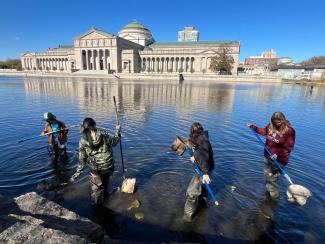
Environmental Arts + Humanities Lab: The City and its Others
The Environmental Arts + Humanities Lab (The City and its Others) is a transdisciplinary lab based in the English department and conceived as a partner of the Committee on Environment, Geography, and Urbanization (CEGU). Visit our page on their website for the latest on our projects and activities.
The lab is organized around the study of rural, urban, and ex-/suburban life and the environment—including the peripheral or sacrifice zones that are not usually conceived of as part of the metropolis, but are in many ways its drivers.
We aim to synthesize the strengths of core faculty in new ways to support innovative critical and critical-creative research by undergraduate, MAPH, and doctoral students in the humanities on topics that may range from conceptions of land-, sky-, and seascape to environmental justice to plantation economies. We will do so in part by animating our own urban locale in Chicago as a laboratory for critical thought—both about our environmental conditions and about the mutual implication of city, country, suburb, sacrifice zone, and the varied forms of hinterlands here and beyond.
In 2024–25 we launched a series of public events aimed at connecting different campus constituencies, from undergraduate to graduate students and faculty, and the general public, beginning with conversations with Allison Cobb, author of Plastic: An Autobiography and with ecopoet/permaculturist julie ezelle patton, author featured in the Winter/Spring/Summer 2024 issue of Chicago Review. In 2025-26 we will be involved in the Anthropocene Consequences symposium on the South Side of Chicago.
Among our core faculty, Jennifer Scappettone has spearheaded the research lab, which represents an extension of her scholarly/creative work and recent courses (including “Ecopoetics: Literature and Ecology,” “Sensing the Anthropocene," and “Breathing Matters: Poetics and Politics of Air”).
Writing and Research Advisor Sylvie Boulette supervises the lab. Undergraduates interested in working with EAH or another English Research Lab for course credit can find more information here.
Message Sylvie (boulette@uchicago.edu) to join the Environmental Arts + Humanities Lab email list and stay in the loop with further events, including our regular book club and writing workshops in the parks.
